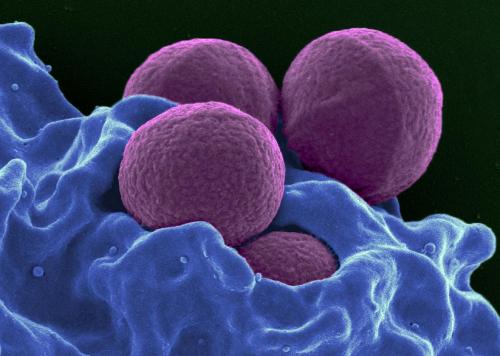Common antimicrobials help patients recover from MRSA abscesses
NIAID-funded trial counters current thinking about treatment effectiveness.
Methicillin-resistant Staphylococcus aureus (MRSA) bacteria are resistant to multiple antibiotics and commonly cause skin infections that can lead to more serious or life-threatening infection in other parts of the body. In new findings, researchers found that two common, inexpensive antimicrobials can help patients heal from MRSA skin abscesses. The findings suggest that current treatment options for MRSA still have a role, even as scientists continue to search for new antimicrobial products.

Methicillin-Resistant Staphylococcus aureus (MRSA).
The study was conducted at hospitals across the United States and involved 796 children and adults with small, uncomplicated skin abscesses. All patients had their abscesses opened and drained as part of standard MRSA treatment. The patients were then sorted into three groups, each of which received a different, ten-day oral treatment regimen. One group received clindamycin, a second group received trimethoprim-sulfamethoxazole (TMP-SMX), and the third group received placebo.
The group treated with clindamycin had an 81.7 percent cure rate, and the group that received TMP-SMX had an 84.6 percent cure rate. The placebo group had a 62.9 percent cure rate. According to the researchers, the findings contradict a commonly held belief that antimicrobial treatment is little better than doing nothing for MRSA skin infections. It corroborates the findings of another NIAID-funded study(link is external) demonstrating that TMP-SMX treatment resulted in better clinical outcomes than placebo for MRSA skin abscesses, and also upholds other findings(link is external) that both clindamycin and TMP-SMX are equally beneficial in treating MRSA skin infections.
The researchers note, however, that the side effects of clindamycin and TMP-SMX (including nausea, diarrhea, and possible new Clostridium difficile infections) can be severe. In addition, some strains of Staphylococcus are resistant to clindamycin. The authors recommend that healthcare providers weigh the risks, but not dismiss these antimicrobials out of hand as viable treatment options for MRSA skin abscesses.
Source: U.S. National Institutes of Health
- 412 reads
Human Rights
Fostering a More Humane World: The 28th Eurasian Economic Summi

Conscience, Hope, and Action: Keys to Global Peace and Sustainability

Ringing FOWPAL’s Peace Bell for the World:Nobel Peace Prize Laureates’ Visions and Actions

Protecting the World’s Cultural Diversity for a Sustainable Future

Puppet Show I International Friendship Day 2020

